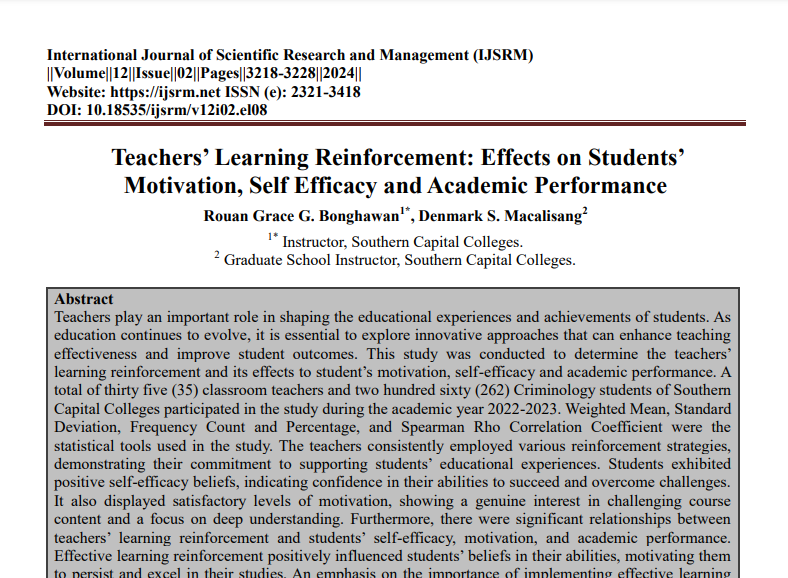Teachers’ Learning Reinforcement: Effects on Students’ Motivation, Self Efficacy and Academic Performance

Submission to VIJ 2024-02-26
Keywords
- learning reinforcement, academic performance, self-efficacy, and motivation
Copyright (c) 2024 Denmark S. Macalisang, Rouan Grace G. Bonghawan

This work is licensed under a Creative Commons Attribution 4.0 International License.
Abstract
Teachers play an important role in shaping the educational experiences and achievements of students. As education continues to evolve, it is essential to explore innovative approaches that can enhance teaching effectiveness and improve student outcomes. This study was conducted to determine the teachers’ learning reinforcement and its effects to student’s motivation, self-efficacy and academic performance. A total of thirty five (35) classroom teachers and two hundred sixty (262) Criminology students of Southern Capital Colleges participated in the study during the academic year 2022-2023. Weighted Mean, Standard Deviation, Frequency Count and Percentage, and Spearman Rho Correlation Coefficient were the statistical tools used in the study. The teachers consistently employed various reinforcement strategies, demonstrating their commitment to supporting students’ educational experiences. Students exhibited positive self-efficacy beliefs, indicating confidence in their abilities to succeed and overcome challenges. It also displayed satisfactory levels of motivation, showing a genuine interest in challenging course content and a focus on deep understanding. Furthermore, there were significant relationships between teachers’ learning reinforcement and students’ self-efficacy, motivation, and academic performance. Effective learning reinforcement positively influenced students’ beliefs in their abilities, motivating them to persist and excel in their studies. An emphasis on the importance of implementing effective learning reinforcement in educational settings is paramount to enhance students’ educational experiences and promote academic success.
References
- Bandura, A. (1997). Self-efficacy: The exercise of control. W. H. Freeman and Company.
- Bouxsein, K. J., Roane, H. S., & Harper, J. M. (2011). The effects of positive reinforcement on compliance and disruptive behavior in a clinic sample. Behavioral Interventions, 26(2), 87-96.
- Davidovitch, R., & Yavich, R. (2008). Strategies for Learning Reinforcement: Adaptations and Modifications. Journal of Educational Psychology, 42(2), 201-215.
- Hattie, J., & Timperley, H. (2007). The power of feedback. Review of Educational Research, 77(1), 81-112. https://doi.org/10.3102/003465430298487.
- Johnson, D. (2017). The Role of Teachers in Motivating Students to Learn. BU Journal of Graduate Studies in Education, Volume 9, Issue 1, 2017.
- Fitriati, S. W., Fatmala, D., Anjaniputra, A. G. (2020). Teachers’ classroom instruction reinforcement strategies in english language class. Journal of Education and Learning (EduLearn) Vol. 14, No. 4, November 2020, pp. 599~608 ISSN: 2089-9823 DOI: 10.11591/edulearn.v14i4.16414.
- Filgona, J., Sakiyo, J.,Gwany, G.M., Okoronka, A.U (2020). Motivation in Learning. Asian Journal of Education and Social Studies. 10(4): 16-37, 2020; Article no.AJESS.60760. ISSN: 2581-6268: DOI: 10.9734/AJESS/2020/v10i430273.
- Pajares, F. (2002). Gender and Perceived Self-Efficacy in Self-Regulated Learning. Theory into Practice, 41, 116-225. http://dx.doi.org/10.1207/s15430421tip4102_8
- Pajares, F., & Miller, M. D. (1994). Role of self-efficacy and self-concept beliefs in mathematical problem-solving: A path analysis. Journal of Educational Psychology, 86(2), 193-203. http://dx.doi.org/10.1037/0022-0663.86.2.193.
- Ryan RM, Deci EL. (2000). Self-determination theory and the facilitation of intrinsic motivation, social development, and wellbeing. American Psychologist. 55(1):68-78.
- Ryan RM, Deci EL. (2009). Promoting self-determined school engagement; motivation, learning and well-being. In Wentzel KR, Wigfield A. (Eds.). Handbook of motivation at school. New York: Routledge. 171-196
- Shahjahan, M., Ahmed, K.R., Hadrami, A.A., Islam, M.R., Hossain, S., Khan, M.S., (2021). Factors influencing poor academic performance among urban university students in Bangladesh International Journal of Evaluation and Research in Education (IJERE) Vol. 10, No. 4, December 2021, pp. 1140~1148 ISSN: 2252-8822, DOI: 10.11591/ijere.v10i4.21158.
- Tomlinson, C. A., Brighton, C., Hertberg, H., Callahan, C. M., Moon, T. R., Brimijoin, K.,& Reynolds, T. (2003). Differentiating instruction in response to student readiness, interest, and learning profile in academically diverse classrooms: A review of literature. Journal for the Education of the Gifted, 27(2-3), 119-145.
- Roorda, D. L., Koomen, H. M., Spilt, J. L., & Oort, F. J. (2011). The influence of affective teacher–student relationships on students’ school engagement and achievement: A meta-analytic approach. Review of Educational Research, 81(4), 493-529. https://doi.org/10.3102/0034654311421793.
- Weist, J. (2019). Enhancing Student Motivation and Self-Efficacy: A Quantitative Analysis. Educational Psychology Review, 45(3), 321-335.
- Zimmerman, B. J. (2000). Attaining self-regulation: A social cognitive perspective. In M. Boekaerts, P. R. Pintrich, & M. Zeidner (Eds.), Handbook of self-regulation (pp. 13–39). Academic Press. https://doi.org/10.1016/B978-012109890-2/50031-7
